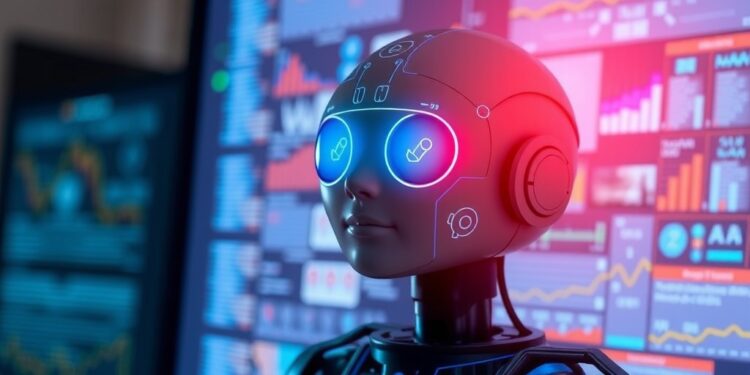
A recent study conducted by leading researchers at the Oxford Internet Institute highlights a pressing concern: the evolving relationship between artificial intelligence (AI) and youth mental health in a digital landscape dominated by rapid technological advancements. As children and adolescents increasingly turn to AI-driven platforms, the implications for their mental wellbeing and developmental processes raise urgent questions. The paper, titled “From Social Media to Artificial Intelligence: Improving Research on Digital Harms in Youth,” underscores the necessity of creating a robust research framework, akin to those in place for social media, to assess the effects of AI on young users effectively.
The authors argue that while digital devices empower youth, they also pose significant risks. Current research paradigms focusing on social media failures must adapt to encompass the complex and multifaceted implications of AI. As the digital environment shifts, traditional methodologies face significant challenges in capturing the dynamism of AI interactions. The emphasis here is on understanding how these technologies impact young users not merely as isolated entities but as parts of a larger ecosystem of digital engagement and mental health.
A crucial aspect that the paper addresses is the fragmented nature of existing studies surrounding AI’s impact on youth. Researchers have pointed out critical limitations in our understanding, including the predominance of purely correlational findings that do not explore causation. Poorly designed studies can overlook the nuances of individual experiences with digital technology. The absence of longitudinal studies particularly stalls our understanding of how sustained AI interactions over time affect mental health trajectories.
Moreover, the research calls attention to over-simplified narratives that characterize social media as a singular harmful entity, much like the emerging portrayal of AI. The authors stress the importance of dissecting the various modes of interaction that young people have with these technologies, along with the significant contextual factors that influence their experiences. By treating AI interactions as a composite of personal and socio-environmental variables, researchers can better forecast potential risks and benefits associated with AI.
Dr. Karen Mansfield, a postdoctoral researcher at the Oxford Internet Institute and lead author, articulates the urgency surrounding this research framework. She asserts that as youngsters adopt AI technologies to navigate their daily lives, outdated frameworks will lead to delayed and ineffective policy responses. An interactive approach involving stakeholders—researchers, policymakers, tech giants, caregivers, and adolescents themselves—is crucial for developing effective safeguards and educational initiatives that adapt to the evolving digital landscape.
Indeed, the implications of neglecting these complexities are manifold. With AI offerings rapidly increasing in sophistication, particularly in areas such as personalized content and adaptive learning environments, the potential for both positive and negative impacts on youth mental health is profound. Thus, the authors advocate for a shift in research paradigms—one that transcends critically narrow approaches to focus on comprehensive, evidence-based methodologies that prioritize the wellbeing of young users.
The paper proceeds to recommend pathways for meaningful collaboration between various stakeholders to ensure the formation of an informed, accountable AI landscape. Effective research must engage with young users as active participants in the conversation about how AI can enhance or detract from their mental health experiences. By contributing lived experiences and insights, youth can inform research and technological development in ways that genuinely reflect their needs and concerns.
Policy implications stemming from this research are equally vital. The growing interdependence of AI and youth engagement demands dedicated, actionable strategies for regulating these technologies within digital spaces where children and teens operate. Without a systematic approach for policy development that is critically informed by research findings, there is a risk of repeating history, wherein reactive measures come too late to thwart emerging issues around mental health and wellbeing.
As AI continues to integrate deeper into everyday life, the authors emphasize the importance of developing clear regulatory frameworks that honor the complexity of digital interactions. Strategies that rely solely on problematization may stifle positive advancements and deter beneficial guidance for both young audiences and their caregivers. Awareness and education about responsible AI use are imperative, and researchers must advocate for a cultural shift that embraces these discussions openly.
In conclusion, the forthcoming era of AI demands rigorous and dynamic research methodologies that reflect the complexities of youth interactions with these technologies. Researchers are called to design studies that not only capture but also contextualize interactions with AI, understanding its implications through longitudinal and causal lenses instead of the traditionally narrow frames fostered by earlier social media discussions. The aim is to cultivate a safer and healthier digital environment where AI technology genuinely contributes to the positive development of children and adolescents.
The findings by the Oxford Internet Institute reflect not just the current state of affairs but serve as a warning to prepare for the forthcoming implications of AI on youth wellbeing. It’s clear that both academia and industry must work collaboratively to develop strategies that promote responsible and ethical use of AI among young users.
Subject of Research: The impact of artificial intelligence on youth mental health
Article Title: From Social Media to Artificial Intelligence: Improving Research on Digital Harms in Youth
News Publication Date: 21 January 2025
Web References: https://www.thelancet.com/journals/lanchi/article/PIIS2352-4642(24)00332-8/fulltext
References: Not provided
Image Credits: Not provided
Keywords: Artificial intelligence, youth mental health, research framework, digital technology, social media, regulatory policy.
Tags: adolescent developmentAI educational initiativesAI-driven platformsArtificial Intelligencedigital harmsdigital technology researchethical AI uselongitudinal studiesmental wellbeingregulatory policystakeholder collaborationyouth mental health





